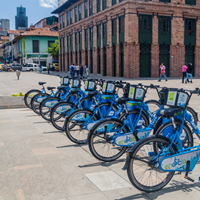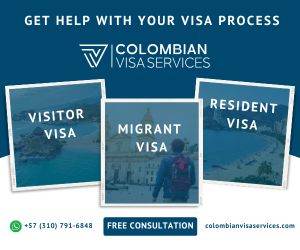Healthcare in Colombia
Summary: Our guide to healthcare in Colombia covers public and private healthcare in Colombia, hospitals, vaccinations, prescription medications and more.
Colombia's healthcare system is comprised of a private healthcare system and a public healthcare system with two types of insurance, EPS and SISBEN (lower income and homeless residents are eligible). While residents are required to have one of the two public health insurance options, many expats also opt to purchase private expat health insurance. Hospitals are different than most expats are accustomed to in that you must bring your own pillows, towels, shampoo, soap, diapers (if having a baby), baby food, etc.
Colombia's Private Healthcare System
While residents must enroll in an EPS health insurance plan (or SISBEN), many expats also purchase private health insurance. There are local private health insurance plans and expat health insurance plans, designed to meet the specific needs of expats, who travel outside of Colombia or who would like access to doctors and hospitals outside of Colombia.
 Colombian Visa Services
Colombian Visa ServicesConnect
We have over 10 years of experience helping foreigners obtain visas, invest, and do business in Colombia. Take the stress out of immigrating to Colombia by working with an experienced, bilingual immigration attorney.
Click connect to have our partner contact you via e-mail and/or phone.
 Colombian Visa Services
Colombian Visa ServicesWe have over 10 years of experience helping foreigners obtain visas, invest, and do business in Colombia. Take the stress out of immigrating to Colombia by working with an experienced, bilingual immigration attorney.
Connect
Click connect to have our partner contact you via e-mail and/or phone.
More Information About Private Healthcare in Colombia
Colombia's Public Healthcare System
The majority of Colombians and residents of Colombia are enrolled in EPS health insurance (public), which is mandatory for all residents (unless you qualify for SISBEN). SISBEN is for homeless and low income residents.
According to the US State Department, "Medical care is adequate in major cities but varies greatly in quality and accessibility elsewhere. Uninsured travelers may need to seek treatment in public hospitals where care is below U.S. standards. Ambulances may be slow to arrive, if at all. Make sure your health insurance plan provides coverage overseas. Most care providers overseas only accept cash payments. We strongly recommend supplemental insurance to cover medical evacuation."
What is an EPS in Colombia?
EPS, which stands for "Entidad Promotora de Salud," is one type of government sponsored health insurance available in Colombia. Even if you choose to purchase private expat health insurance, you must be enrolled in an EPS (unless you qualify for SISBEN, which is for lower income and homeless residents). The cost of EPS health insurance is extremely low and many expats use their IPS (health center assigned by your EPS) for basic care and go to private doctors using private health insurance for other issues and chronic conditions. "EPS is the [primary] Public Health system in Colombia and mandatory for all residents. It's not about being eligible, by law you have to have it. The cost is not based on age but rather on your income," said one expat.
"Anyone interested in living in Colombia, get your cedula and immediately sign up for Sanitas EPS and worry about the details later on. You can leave the country, not pay, and you will STILL by a member years later (happened to me) And you do NOT pay for years missed, just the months of your last year here)," commented one expat.
What is SISBEN health insurance in Colombia?
SISBEN, which stands for "Sistema de Selección de Beneficiarios Para Programas Sociales," is a type of insurance for lower income and homeless Colombians.
More Information About Public Healthcare in Colombia
Hospitals in Colombia
If you research healthcare, surgery and hospitals on our Colombia forum, you will find discussions that are incredibly insightful and offer first-hand knowledge about the quality of care expats received at hospitals in Colombia. This type of information is hard to find and we are very grateful to our members for sharing their experiences.
One expat advised newcomers saying, "If you know how to navigate the system, find the best doctors, etc., healthcare in Colombia is good, if not excellent. It depends also on whether you have basic EPS (and which one), a 'medicina prepagada' policy, or pay out of pocket. And generalizations can be misleading. You may be just fine getting a heart bypass operation in Colombia, but better off in (for example) the USA for a certain cancer treatment. It's definitely different. Some hospitals are very casual about cleaning up blood on the floor, and may not have toilet paper in the restrooms, but the doctors are good. The best thing is that you know you are not facing bankruptcy when you exit the hospital."
"I can confirm that the recently expanded Manizales cancer hospital (S.E.S. Hospital de Caldas in Manizales) is probably the best in the country and the best facility that I have seen anywhere in the world. First class equipment, caring nurses, and internationally trained doctors. Over the last 4 years I have been through the whole treatment cycle for Multiple Myeloma, and now just do monthly check-ups, all paid for by the EPS. As in most countries, cancer cases are appearing at an ever increasing rate, and Manizales has more than expanded its facilities to cope," commented one member.
An expat mom who gave birth at a hospital in Monteria talked about the differences between hospitals in the US and Colombia. She said, "[I] Was pretty prepared. Hospitals here in Colombia are different from the USA because most of the time they don't give you pillows, nor do they provide, soap, shampoo, toothbrush, razors etc. You have to bring your own. In addition, they don't give you any towels, diapers, any baby clothing, baby food/formula or supplies at all. Just be aware of that. Every morning a nurse arrived about 7 a.m. to bathe the baby. They take your towel, soap etc. amd take your bundle of joy to another area, clean him up and return him to you in a few minutes. These clinics/hospitals didn't have nurseries either."
Colombia Vaccinations
If you're moving to Colombia, you should get all of the recommended vaccinations for Colombia. Unlike tourists who are in Colombia for a short period of time, expats risk of exposure to various illnesses is much greater due to length of stay, travel to more parts of the country and exposure to different foods. In addition to measles-mumps-rubella (MMR) vaccine, diphtheria-tetanus-pertussis vaccine, varicella (chickenpox) vaccine, polio vaccine, and your yearly flu shot. Additionally, hepatitis A, hepatitis B and typhoid. Rabies is also recommended for many groups. Depending upon where you will be living or traveling, preventative malaria medication and yellow fever vaccinations may also be recommended.
Additional Info: Colombia Vaccinations
Mosquito-Borne Diseases in Colombia
According to the US State Department, Chikungunya, Dengue, Malaria, Yellow fever and Zika are all prevalent in Colombia. The CDC offers advice on limiting exposure to mosquitos and other disease-carrying insects.
Prescription Medications in Colombia
"One thing to find out if you take any prescription medications is their availability in Colombia - or what the alternatives might be. Obviously given the cost that is associated with some international drugs they may not readily be available in Colombia," advised one expat in Colombia. "Also a note about prescription drug prices. EPS would only give me a month's supply (I need to find out if I can obtain more under a 'vacation waiver') so I had to buy 30 days of anti-hypertension medicine, private farmacia cost was $140,000. EPS cost for 2 medicines was $2700 pesos," explained another expat.
"If traveling with prescription medication, check with the government of Colombia to ensure the medication is legal in Colombia. Always carry your prescription medication in original packaging with your doctor's prescription," advised the State Department.
Still have Questions? Colombia healthcare FAQ
About the Author
 Betsy Burlingame is the Founder and President of Expat Exchange and is one of the Founders of Digital Nomad Exchange. She launched Expat Exchange in 1997 as her Master's thesis project at NYU. Prior to Expat Exchange, Betsy worked at AT&T in International
and Mass Market Marketing. She graduated from Ohio Wesleyan University
with a BA in International Business and German.
Betsy Burlingame is the Founder and President of Expat Exchange and is one of the Founders of Digital Nomad Exchange. She launched Expat Exchange in 1997 as her Master's thesis project at NYU. Prior to Expat Exchange, Betsy worked at AT&T in International
and Mass Market Marketing. She graduated from Ohio Wesleyan University
with a BA in International Business and German.
Some of Betsy's articles include 12 Best Places to Live in Portugal, 7 Best Places to Live in Panama and 12 Things to Know Before Moving to the Dominican Republic. Betsy loves to travel and spend time with her family. Connect with Betsy on LinkedIn.
Additional Information:
- Colombia Guide
- Healthcare & Health Insurance in Colombia
- Members Talk about Healthcare & Health Insurance in Colombia
- Best Places to Live in Colombia
- Real Estate in Colombia
- Guide to Real Estate in Colombia
- Pros & Cons of Living in Colombia
- Cost of Living in Colombia
- 9 Tips for Buying Property in Colombia
- 6 Best Places to Live in Colombia
- 2025 Guide to Living in Colombia
- Pros and Cons of Living in Colombia 2025
- 2025 Guide to Moving to Colombia
Comments
sealodgeg9You should add to this report that there is now an additional coverage called Plan Complementario 60 Plus for an additional cost available through Sura and any Insurance broker. You must already be signed up with EPS. The plan covers everything and a private room if in hospital. It's the Cadillac of coverage. We pay $137 a month for both of us. No pre-existing conditions and no deductibles.




